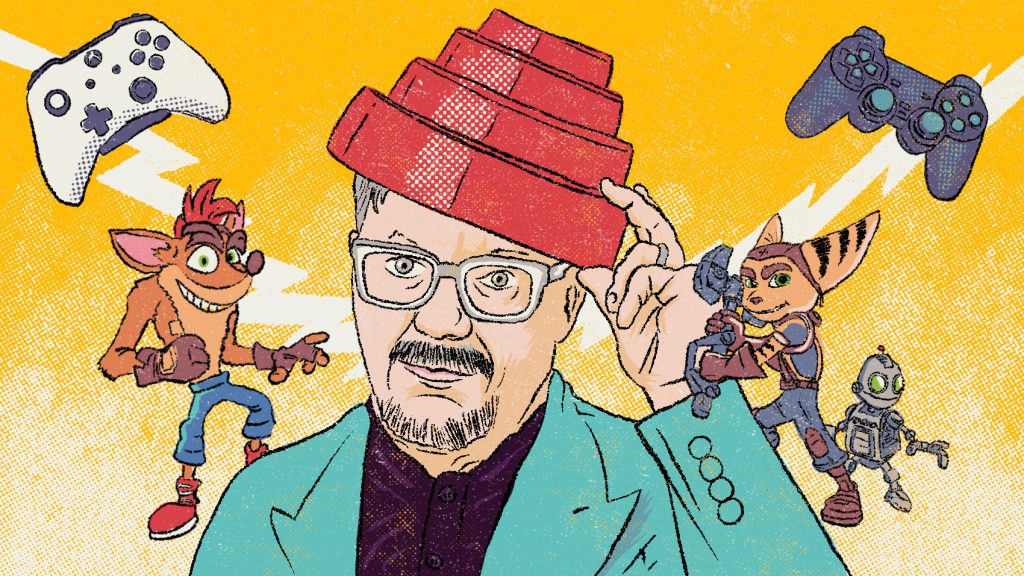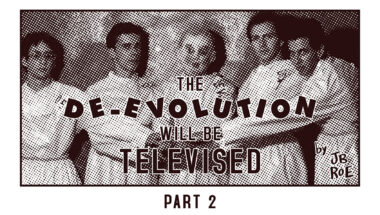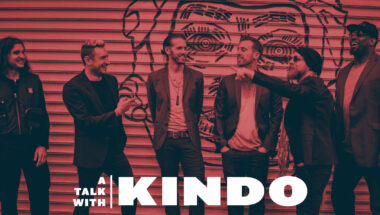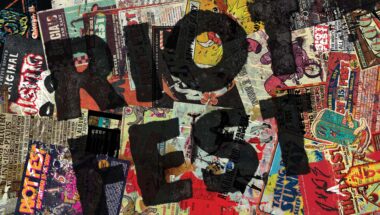The name Mark Mothersbaugh can send quite a few signals to the brain, depending on who you’re speaking with. Most folks will immediately hear Devo, the de-evolutionist collective that pushed new wave to the top of the charts. Others can surely sing the theme to Nickelodeon’s Rugrats, a show Mothersbaugh scored for 13 years (and that any cable-clung 90s kid remembers, clear as day). Some may even recall his name gracing the credits of films like The Royal Tenenbaums or Thor: Ragnarok. Slightly less known (but equally impressive) are the numerous video games that Mothersbaugh has scored.
Mothersbaugh’s portfolio has expanded to nearly every medium of art over the past three decades of his career, amounting to a staggering output. He’s credited as a composer for over 200 different films, television shows, and video games, where his name typically appears with the production company he and his brother Bob founded in 1989, Mutato Muzika. His earliest work with Moog synthesizers—at the time, a groundbreaking innovation—helped pioneer pop music’s electronic frontier, and established Mothersbaugh as the perfect answer to the multi-industry call for more switched-on soundtracks (no doubt thanks to early Moog innovators like Wendy Carlos, who scored films like The Shining and Tron). Countless directors, producers, and game developers have knocked on his door seeking an innovative, one-of-a-kind sound for their project; with gaming, Mothersbaugh’s timing couldn’t have aligned more perfectly.
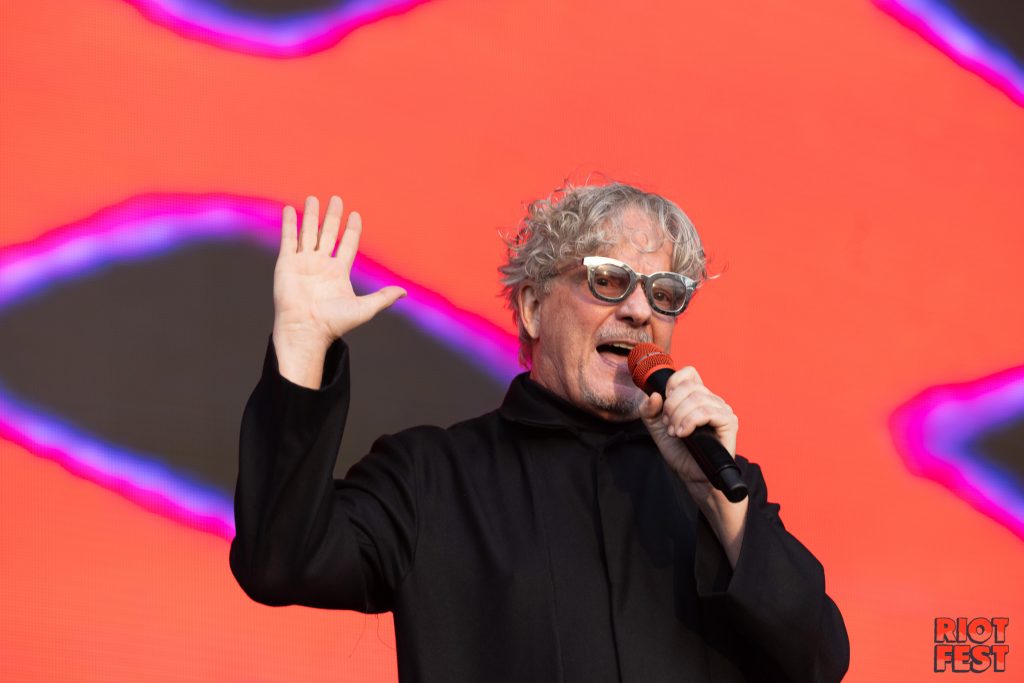
As DEVO began to wind down in 1991, the gaming industry was on the verge of a 3D revolution. Home consoles up until this point featured mostly 2D side-scrolling titles with chiptune soundtracks; the technical leaps and bounds made with 5th generation consoles like the Nintendo 64 and Sony’s first PlayStation meant that CD-quality sound effects and music were now a possibility. In 1994, work began on Crash Bandicoot, a PlayStation exclusive initially referred to internally as “Sonic’s Ass” that would become a defining entry into the 3D platformer genre. Mutato Muzika was recruited for the soundtrack, during which Mark Mothersbaugh would quickly fall in love with the process. He’d go on to produce dozens of soundtracks for all kinds of different games: life simulators like The Sims 2, motion-controlled puzzle games like Boom Blox, and action-platformers like this summer’s PS5-exclusive Ratchet & Clank: Rift Apart.
For our latest Autodiscography, I spoke to Mark Mothersbaugh on the heels of DEVO’s Riot Fest performance, listing his biggest gaming credits and hearing his experiences working with developers like Naughty Dog, Insomniac Studios, and even Steven Spielberg (who once unexpectedly made a Wii game) over the years. Our conversation happened to fall just around the 25th anniversary of Crash Bandicoot, the game that started it all for Mothersbaugh.

CRASH BANDICOOT (1996)
RIOT FEST: You’re credited on the soundtracks for the four Crash games Naughty Dog made: Crash Bandicoot, Cortex Strikes Back, Warped, and Crash Team Racing. These were mostly written by Josh Mancell, who worked at Mutato Muzika with you. How much of these soundtracks were just you?
MARK MOTHERSBAUGH: I wrote a lot of the themes. Especially the early themes. [Naughty Dog] wanted to hear the Crash music mocked up pretty close… it was something they’d show the marketing and executive higher-ups who would come in and see parts of the first Crash Bandicoot. It slowly started morphing into a situation where they wanted the “mock-ups” sound closer to a final product—but it was becoming impossible for one composer to just sit there and do everything for a game, unless you had several years.
So, you get people that specialize in things like orchestrating, arrangements, whatever, to work on it: you give them themes, you do a rough mock-up, and then those people fine-tune it all. It’s all a team effort—and for that, Josh was my team. Mutato works a lot like a band in a way, even if there’s some projects where I’m the only person who worked on it. In the case of Crash Bandicoot, Josh really wanted to work on it, so we did those soundtracks together.
What I learned from scoring Crash Bandicoot was that scoring a game was much more complex than scoring a film. It was more interesting too—you write a game’s score with different levels of intensity for each particular level, and it makes you think about music cues in a totally different way. It became fascinating for me to work on games early on in my career, and games became something I especially enjoyed working on… and I love games now!

JAK & DAXTER: THE PRECURSOR LEGACY (2001)
Right after [Josh & I] finished Crash Bandicoot, games started getting really big. About a year after we finished the soundtrack for the first Jak & Daxter, a director I was working on a film with brought his son over to see my studio. I look at the kid, he’s really young—10 or 12, or something—and I’m thinking, “Okay. He probably watched Rugrats when he grew up, right?”
So I took him over to show him some gold records and trophies that were related to Rugrats… and he was totally bored. [Laughs] Then, the kid looks over at some art from Jak & Daxter and goes, “You did Jak & Daxter?!” I tell him, “Yeah,” and he says “Oh, I remember all the music from level seven!” or something like that—and then he just starts singing it to me, note for note. Like, wow, this kid doesn’t care about TV… but he loves video games! I think that’s when I first realized how big and powerful games were becoming. Now, games are monster-sized.
Right—and with that, Naughty Dog has grown to become one of the biggest development studios in the industry. You got to work on their first big hit, at a very early point in the company’s history. What was that like? Did you notice any major changes between working on Crash and Jak & Daxter?
Well, for the first Crash Bandicoot they were coming over to our place. I knew the Naughty Dog team when they were just regular kids—they all drove junk cars to work. Then I remember when we did the next one [Cortex Strikes Back], all of a sudden they were coming over in fancy vehicles. And I was like, “Oh, something changed!” [Laughs] That’s when you knew they’d moved up in the world, from an economic standpoint.

THE SIMS 2 (2001)
I worked again with a team for this one, writing many of the themes. I liked that game. I loved all the crazy thoughts behind it—like, that [Sims] could have hissy fits, or they can fall in love, or they could be sad and depressed. I loved that stuff, it was really interesting.
Compared to your past projects, The Sims 2 was not your standard action-packed platformer. With Crash, you probably had a good idea what a boulder chase, or a frozen tundra, or a jungle should sound like—what was your approach to scoring this type of modern life simulation game?
Totally. The idea was like, “What would this world require?” To me, that was something part retro, part futuristic. The music also had to be less repetitive than anything I’d done before, given how much you’d hear it. I wanted my tracks for The Sims 2 to have a bit of a song feel to them, so you’d hear the game’s music and think “Oh, maybe that could be a song instead.” We even talked about that—should we do these with lyrics? And then put out a Sims album after that? We never did it… but we did collect all of the music instrumentally.
There’s actually a lot of big artists that are featured in newer Sims titles: Katy Perry, Paramore, even My Chemical Romance. And those artists recorded their lyrics in Simlish, the gibberish language spoken in-game.
Wouldn’t you have liked to have heard Simlish songs charting? [Laughs]
I would have loved that. We can only imagine the influence it could’ve had!
Right? I wish games could have happened at a time when there were still reliable top 40 records. I would have loved if game technology would have affected pop music more—I think we’d have more interesting pop music, if that were the case.

BOOM BLOX (2009)
This one I’m very, very interested to hear about. I remember seeing tons of commercials for Boom Blox—it was advertised everywhere, most notably on the cover, that it was made by Steven Spielberg. Which was definitely eye-catching, since it was this Jenga-like Wii game with a bunch of cube-shaped animals.
I don’t think there’s any games really quite in that style, either. I mean, have you seen other games that remind you of Boom Blox?
Maybe like, Angry Birds?
Yeah, just a bit… Oh man, I should have had all the games sitting in front of me so I could look at the cover. You’re asking a 71-year-old guy to remember something.
To remember Boom Blox, of all things.
[Laughs] Yeah, to remember Boom Blox—which is in there somewhere.
I do remember we did a lot of experiments before we landed on anything that we were happy with. It was interesting working with Steven Spielberg, instead of these younger developers we’d worked with. For him to be involved, it really made you think that games had come into their own. Because Steven Spielberg… that was pretty serious! I mean, he’s still a pretty big deal, but he was a really big deal back in those days. It felt like it added a lot of credibility to the world of games just for him even to be involved in it.
I couldn’t tell if he played games or not, but he did seem to really want to… I think for him, [making a game] was like the techno version of being a young kid in a sandbox with plastic toys. I think Boom Blox was Spielberg tapping into something he did when he was a kid, and was very much his inner child.
Wow.
Yeah. But I’ll tell you something funny about Steven Spielberg. It was a little bit awkward for me [while making the game], we never brought this up. Years before, he had called me up and wanted me to come in and talk about a movie he was making with a friend of his that was going to direct it. It was called Back To The Future. And I got all excited because I’d been scoring things, and I thought, “He’s going to hire me to score the film!” So I read the script. I thought, “Oh, that’s great. I love this story. I want to score this movie.” And I was so excited.
So I went in to meet him and Robert Zemeckis, who directed it, and they go, “We chose you because we came and saw your band play at the Palace. You’re so good in the Devo music videos. We love you on stage. So… there’s this scientist, this crazy inventor in the movie, and we want you to play that part.
No way. They wanted you to play Doc Brown?
Yeah. I go, “You want me to act?” And he goes, “Yeah!” And I go, “Oh, no. I don’t want to do that.” [Spielberg and Zemeckis say,] “Well, you’ve done a great job in all your films.” I go, “Yeah. But I made that up. I’m not acting. Those are things I wrote. No offense. But I’m not interested in being in a film.” I wasn’t interested in being an actor in somebody else’s film because I really don’t know how to act. I remember leaving there and being so bummed out—I thought I was going to score Back to the Future. That would have been great! At least Christopher Lloyd got a career out of it.
So… the whole time you were making Boom Blox, you were trying to figure out whether or not to bring up Back To The Future with Spielberg?
Yeah.
Did you do it?
I did not. [Laughs]

SKATE 3 (2010)
This one was just one song, what I did. Devo was already really connected to skateboarding at this point. K-Rock radio had started up right about the time that I was scoring a skate film called Lords of Dogtown. They were playing something by Devo every hour on K-Rock. So skaters ended up falling in love with Devo, along with Thrasher Magazine—they always had lists of favorite skateboarding songs, and we were on those lists a lot.
Right around then, we were shooting [the music video for] “Freedom of Choice,” and we wanted to have skateboarders in the video. We wore skateboard protective gear that one of the skateboarding manufacturers had designed for us. It looked really cool… it gave us more of a gladiatorial feel. It allowed me and my brother to jump into the audience and land on our knees, or go head over heels into the audience and come back to the stage without a knee torn off. We went to the Marina del Rey Skatepark at that time period and shot a bunch of footage with all the guys that were skating there.
As it turned out, the skaters from Lords of Dogtown were there, including Stacy Peralta. Eventually, Tony Hawk—who was part of the third generation of skaters—he saw that stuff, and he went crazy because of that video. Devo ended up on all his lists for projects. The folks making Skate 3 also had us on a list, so I was happy to do a track for the game.

RATCHET & CLANK: RIFT APART (2021)
There’s a guy who has worked on films with me before named Wataru Hokoyama [Resident Evil 5, Knack], who I asked for this one if he wanted to get involved in a game with me. He was down, so we worked together on the Ratchet & Clank: Rift Apart score. It had a long germination period because of COVID-19. We ended up with more time than we normally had on a game, which usually have a long arc to them. This one was even longer. It gave us more time to dial in the different levels and the different sounds.
With your past video game work, your contributions were often some themes, or some songs here and there; for Ratchet & Clank: Rift Apart, you fully scored the whole game. What was that like?
Well, now it’s a whole ‘nother world! We recorded a full orchestra in Nashville. Then I put synths on top of it. Then, on the different layers, I mixed in synths and orchestra to various degrees to give each planet its own kind of feel. I have to say, I was really impressed with my Ratchet & Clank experience. Right now, I would say it was my favorite experience scoring a game.
To be honest, the people at Insomniac were much more knowledgeable about orchestral music than many of the studios I work with in Hollywood—people that have been doing orchestral music for 80 years. I’ve had crazy comments posed to me—some people are heads of music departments, and when you hear them talk you go, “They know nothing about music.” Insomniac, on the other hand, knew how to assist with everything and could talk very coherently about their thoughts. They showed up at the recording sessions. And they were an integral part to what we were doing. And I thought, “Man, none of the studios I’ve worked with are like this.”
Are there any games that you’ve played lately, or any games in general that really stuck with you?
Unfortunately I was busy battling COVID-19 during the pandemic, as opposed to a lot of kids got to sit down and play games throughout that.
I can tell you this: I have a game. And I can’t talk to you about it yet. I don’t know how to sell games, anyways. But when I had COVID, it came to my head—and it won’t go away. So I would be up for finding somebody to work on that with, if you know anybody.
